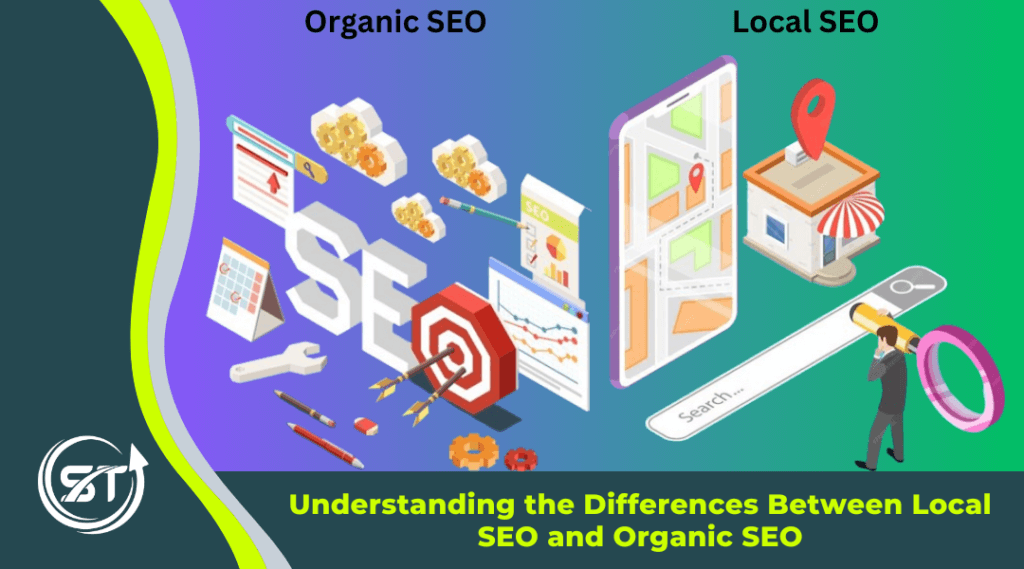
In the online world, making your website seen and getting more visitors is important. Imagine your website is like a shop in a big online marketplace, and to get more people to notice it, you use SEO strategies. It’s like putting up signs that guide visitors straight to your shop. So, when someone is looking for what you offer, they can easily find your online store. SEO is a helpful tool that makes your website stand out in the busy online world, like a beacon in a giant digital marketplace.
In the digital marketing platform, Search Engine Optimization (SEO) plays a pivotal role in enhancing a website’s visibility and attracting organic traffic. Two essential components of SEO are local SEO and organic SEO, each serving distinct purposes for businesses. Let’s have a look into the key differences between local SEO and organic SEO.
Table of Contents
ToggleWhat is Organic SEO
When we talk about organic SEO, we’re basically talking about helping our website get noticed on the internet without paying anything. It’s like making your website stand out and grow naturally over time in a crowded online market. The main aspect of this is that it doesn’t stick to one specific location and shows up when people search for specific words.
Key Elements of Organic SEO
1. All about content:
The core principle of organic SEO revolves around the creation of high-quality, relevant content. Search engines, such as Google, prioritize delivering valuable information to users, which is why websites with exceptional content are often rewarded with higher rankings. The website needs to develop content that effectively answers users’ questions, addresses problems, or provides valuable insights within a specific industry or about their services.
2. Keyword Optimization:
Understanding what words or phrases users are typing into search engines is crucial. Imagine you’re trying to find something on the internet like Best Digital Marketing Services provider, and you type in those specific words. Those words are keywords. Keyword research is about figuring out what words people use and making sure those words are in your content. It involves researching and strategically incorporating relevant keywords into your content, titles, and meta tags. This helps search engines match your content with user queries.
3. Backlinks Matter:
Backlinks play a crucial role in organic SEO as they are links from reputable websites that point to your website. Search engines recognize these backlinks as indicators of trust and confidence in the quality and relevance of your content. By building a network of high-quality backlinks, you can significantly enhance your website’s authority, which can positively impact your organic SEO efforts and lead to improved rankings.
4. Technical SEO:
Another element of organic SEO is ensuring that your website is technically sound. This involves optimizing site speed to ensure fast loading times, making your website mobile-friendly to cater to users on mobile devices, and implementing structured data to help search engines better understand your content. A website that is technically optimized not only enhances the user experience but is also more likely to rank higher in search results. By paying attention to these technical elements, you can improve your website’s organic SEO performance and attract more organic traffic.
5. User Experience is Key:
Organic SEO is all about creating a good experience for people visiting your website, much like making your physical store cozy for customers. By making sure your website is easy to use, well-arranged, and filled with helpful information, you can make visitors happy. Happy visitors tend to spend more time on your site, tend to come back again, and even recommend it to others.
6. Patience Pays Off:
Unlike paid advertising, which can provide immediate visibility, organic SEO is a long-term strategy that takes time to show results. It requires patience and consistent effort to optimize your website, create high-quality content, and build relevant backlinks.
Benefits of Organic SEO
1. Cost-Effectiveness:
Organic SEO is cost-effective as it brings free, sustainable traffic to your website over time. While it requires effort to build, the long-term benefits surpass the initial investment as compared to paid advertising.
2. Credibility and Trust:
Websites appearing at the top of organic search results are often seen as trustworthy and credible by users. Organic SEO centres around delivering valuable content, acquiring backlinks, and improving user experience, all of which contribute to building a positive online reputation. When your website ranks high, it indicates recognition from search engines for its authority and relevance. This, in turn, boosts your credibility among users, increasing the likelihood that they will trust and interact with your content.
3. Sustainable Visibility:
Organic SEO takes time and regular effort to get your website to show up high in search results. But once it’s up there, it tends to stay visible for a long time, which is great because it means you get a steady stream of visitors without always spending more money. Unlike paid ads that stop working when the campaign ends, organic SEO keeps your website visible for a long time.
4. Targeted Traffic:
Organic SEO is a powerful tool for businesses. By using the right words on their website, they attract people who are genuinely interested in what they offer. This not only increases the chances of turning visitors into customers but also helps businesses grow. It’s all about connecting with the right audience at the right time and driving more conversions.
5. User Experience Enhancement:
A key aspect of organic SEO is creating a positive user experience. Websites optimized for organic search tend to be well-organized, easy to navigate, and rich in valuable content. This not only satisfies visitors but also signals to search engines that the website is authoritative and deserves a higher rank.
6. Adaptability to Algorithm Changes:
Organic SEO strategies follow the rules of search engines, making them less affected by sudden changes in algorithms. They provide stability and sustainability by using ethical practices. This approach helps businesses achieve long-term success and guards against unexpected shifts caused by algorithm updates.
7. Long-Term Results:
Organic SEO may take some time to show significant results, but the benefits are long-lasting. By optimizing your website and content according to search engine guidelines, you can gain authority and trust from both search engines and users. This can result in higher search rankings, increased organic traffic, and more conversions over time.
What is Local SEO?
Local SEO is a specialized strategy that improves visibility in local search results. It targets specific geographic locations, helping businesses stand out in their local community. By optimizing their online presence, such as website content and Google My Business profile, businesses can attract more local customers actively searching for their products or services. It’s a valuable tool for establishing a strong local presence.
Key Elements of Local SEO
1. Geographical Focus:
Local SEO is tailored towards optimizing a website’s visibility for local searches. It targets a specific geographic area, making it ideal for businesses with physical locations or those catering to a local audience.
2. Google My Business (GMB):
Local SEO revolves around optimizing your Google My Business (GMB) profile. It is important to ensure that the business information on your GMB profile is accurate, including name, address, phone number, business hours, and categories. By optimizing the GMB profile, you can enhance website visibility for local map results. Optimizing your GMB profile is a vital step in improving your local presence and increasing the chances of appearing in local search queries.
3. Local Keywords:
Local SEO involves using location-specific keywords in content, making it easier for search engines to connect businesses with local searches. For instance, a digital marketing company that provides SEO services in Mumbai might use keywords like “Best SEO services in Mumbai” to attract local customers.
4. NAP Consistency:
Ensuring NAP consistency (Name, Address, Phone number) across online platforms is crucial for local SEO. It builds trust with search engines, leading to higher rankings in local searches. Consistent NAP information establishes reliability and credibility, attracting local customers and boosting online visibility. Businesses should regularly audit and update NAP details as it has a positive impact on local SEO.
5. Local Citations:
Building local citations, which include a business’s NAP (Name, Address, Phone number) on online directories, is indeed an important aspect of improving local visibility. These citations, commonly found in local business directories, play a significant role in enhancing a business’s online reputation. By ensuring consistent and accurate NAP information across these directories, businesses can increase their online presence and attract more local customers.
6. Reviews and Ratings:
Asking your customers to share their experiences on your Google My Business (GMB) page is important. This helps boost your online reputation and makes more people notice your business in local searches. Positive reviews build trust, making others more likely to choose your business. People often trust what others say online when deciding what to buy. Search engines also look at the number and quality of reviews to decide how high to show your business in local search results. By actively encouraging positive reviews on your GMB page, you can make your business stand out more in local searches.
7. Local Link Building:
Link building for local SEO involves building local links from other reputable local websites. These backlinks act like referrals or “local citations” and should come from legitimate and relevant businesses within your target area. Building local links from reputable local websites further boosts your local authority and signals to search engines that you’re relevant to the community.
Benefits of Local SEO:
1. Increased Local Visibility:
Local SEO is an essential strategy for businesses looking to attract nearby customers. By optimizing your business’s online presence for local search results, you increase visibility and outshine competitors when people are looking for products or services in their area. This increased visibility is crucial for driving traffic to your website and ultimately attracting local customers.
2. Targeted Traffic:
When you optimize your online presence for local searches, you attract highly targeted traffic of users who are actively searching for the products or services you offer in your specific location. This makes them more likely to convert into customers, as they have a higher intent to purchase.
3. Improved Online Reputation:
Local SEO involves managing and encouraging customer reviews. Positive reviews not only enhance your reputation but also influence potential customer decisions, making them more likely to choose your business over others. By actively monitoring and responding to customer reviews, you can build trust, enhance your online presence, and attract more local customers. This, in turn, increases the likelihood of converting them into loyal customers and driving more business to your location.
4. Enhanced Trust and Credibility:
Appearing in local search results and having a well-optimized Google My Business (GMB) profile builds trust. Customers are more likely to trust businesses they find easily online, leading to increased credibility within the local community.
5. Increased Foot Traffic to Physical Stores:
Local SEO is a powerful driver of foot traffic to physical stores. When people find your business easily in local searches, they’re more likely to visit your actual location, translating online visibility into real-world customer visits.
7. Cost-Effective Marketing:
Compared to traditional advertising, local SEO is a cost-effective marketing strategy. It targets users who are actively looking for local businesses, making it a more efficient way to spend your marketing budget.
8. Mobile Optimization:
Local SEO is crucial for businesses due to the rise of mobile searches. When people perform “near me” searches, it’s usually on their mobile phones, and they expect quick results. Optimizing for local searches ensures that your business is easily discoverable when users are on the go and looking for nearby products or services.
Wrapping up:
Local SEO and organic SEO serve different purposes. Local SEO is essential for businesses targeting local markets, while organic SEO helps businesses reach a broader audience. Although they have different scopes and audiences, they share the goal of enhancing online visibility. Combining both strategies can significantly improve a business’s success in the digital space, providing a strong online presence in both local and global search results.












